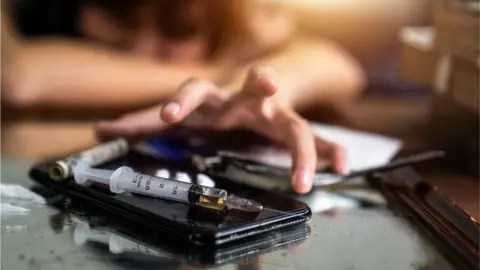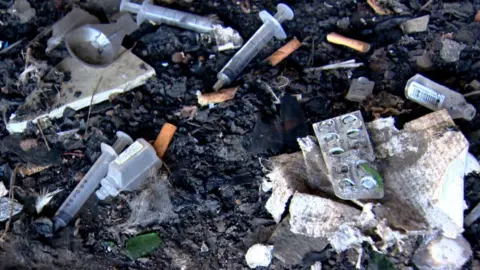'Surprise and disappointment' at UK drug response
 Getty Images
Getty ImagesA cross-party group of MPs has accused the UK government of the almost "wholesale rejection" of moves to tackle Scotland's record drug deaths.
It comes after the Scottish Affairs Committee published a report in November calling for a radical re-think of current drugs policy.
Their recommendations included decriminalising drugs for personal use and backing consumption rooms.
However, the UK government has rejected most of the recommendations.
They include calls to declare Scotland's record drug deaths - 1,187 in 2018 - a public health emergency.
The UK government also said a recommendation to reform the 1971 Misuse of Drugs Act and decriminalise drugs for personal use would not "eliminate the crime committed by the illicit trade, nor would it address the harms associated with drug dependence".
They added: "There is a strong link between drugs and crime, which is why we reject the assertion that the Department for Health and Social Care should lead on drug misuse. We know that people who regularly use heroin, cocaine or crack cocaine are estimated to commit around 45% of all acquisitive crime."
Since 2008 the Scottish government has treated drug misuse as a health issue rather than a criminal justice issue.

On the idea of consumption rooms, the UK government responded that: "We want to do all we can to stop people having access to drugs that could ultimately kill them. No illegal drug-taking can be assumed to be safe and there is no safe way to take them."
They added: "Our approach on drugs remains clear - we must prevent drug use in our communities, support people through treatment and recovery, and tackle the supply of illegal drugs."
What are safe drug consumption facilities?
Glasgow City Council has proposed allowing users to take their own drugs under the supervision of medical staff at a special facility in the city, but the idea has been blocked by the Home Office.
Sometimes dubbed "fix rooms", the aim would be to encourage users who inject heroin or cocaine on Glasgow's streets to enter a safe and clean environment.
It was hoped the scheme would encourage addicts into treatment, cut down on heroin needles on city streets and counter the spread of diseases such as HIV.
Last week, a recovering heroin addict launched a drug consumption van in Glasgow despite warnings it could break the law.
Peter Krykant said he hoped it would prevent overdoses and blood-borne viruses among drug users.

The cross-party committee currently comprises chairman, SNP MP Pete Wishart, and includes five Conservatives, two Labour members, two Lib Dems and two other SNP MPs.
Mr Wishart said this report, which was worked on by the committee when its membership was made up of MPs from the last parliament, was based on one of the most "extensive drugs inquiries in Scotland ever conducted".
Following the government's response to the report, he said: "We are surprised and disappointed by the government's almost wholesale rejection of recommendations by a Westminster Select Committee after collecting a substantial body of evidence from people with lived experience, charities and academics, as well as legal, criminal justice and health professionals…few of these will find comfort in this response."
He also accused the government of providing little evidence to support its stance and called for what evidence there was to be made available following of a drug summit in February.
He added: "What is evident is there's little change in the government's drugs strategy despite the death rate in Scotland from problem drug use remaining stubbornly higher than any country in Europe.
"This fact itself should demonstrate that the current approach isn't working. This is undoubtedly a public health emergency."
The governments' views
All UK drugs misuse legislation is currently reserved to Westminster.
A spokesman for the Home Office said it was committed to preventing drug use, supporting people through treatment and recovery and tackling the supply of illegal drugs.
"We have no plans to introduce drug consumption rooms or decriminalise drugs. Illegal drugs devastate lives and communities, and dealers should face the full consequences of the law," he added.
"We are committed to tackling drug misuse and held a UK-wide drugs summit in Glasgow earlier this year to discuss the most effect ways to tackle drug misuse and their terrible impact across Scotland, Wales, England and Northern Ireland."
The Scottish government has said it welcomes support for the introduction of a safe drugs consumption room in Glasgow as part of efforts to reduce deaths there.
A spokeswoman said when the report was published in November: "The outdated Misuse of Drugs Act 1971 should be amended to allow us to implement a range of public health focused responses, including the introduction of safe consumption facilities in Glasgow.
"We call on the incoming UK government to amend the Act or to devolve those powers to Scotland."
